|
|
|
Sort Order |
|
|
|
Items / Page
|
|
|
|
|
|
|
| Srl | Item |
| 1 |
ID:
141211
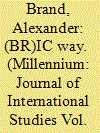

|
|
|
|
|
| Summary/Abstract |
This review article assesses two books against the background of the question of whether China and India as emerging economies provide a development ‘alternative’. The double meaning of this refers to, first, their own experience of recent rapid growth and the chances of replicating this development elsewhere. Second, it points to the external development assistance policies of the BRICs towards the global South and their impact on development thinking and practice.
|
|
|
|
|
|
|
|
|
|
|
|
|
|
|
|
| 2 |
ID:
070790


|
|
|
| 3 |
ID:
162453


|
|
|
|
|
| Summary/Abstract |
Can developmental aid bring peace to war-torn communities? The current literature is divided on this issue. One line of reasoning suggests that aid is likely to decrease violence by improving employment and prosperity, thereby making participation in conflict more costly. Another view cites evidence showing an association between aid projects and increased insurgent activity. Addressing this contradiction, we argue that different types of aid projects lead to different outcomes, as some projects foster an unequal distribution of benefits within communities. Our reasoning draws on qualitative accounts from conflict zones, recent research on how grievances associated with exclusion can foster civil war onset, and experimental findings regarding perceived inequity and punishment. Building on this scholarship, we use a recently developed event-matching methodology to offer insight from contemporary Afghanistan. Aid projects that tend to exclude portions of the community yield more insurgent activity in their wake than more inclusive projects. These results shed light on why some aid projects reduce violence while others do not, emphasizing that efforts to ‘win hearts and minds’ can be a source of both contentment and contestation.
|
|
|
|
|
|
|
|
|
|
|
|
|
|
|
|
| 4 |
ID:
086315
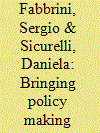

|
|
|
|
|
| Publication |
2008.
|
| Summary/Abstract |
While the major feature defining United States' (US) foreign policy since the Cold War has been the use of coercive means such as military power and economic sanctions, the European Union (EU) international role, despite recent attempts to develop military capabilities, remains that of a civilian power. The literature on transatlantic relations has explained this difference by stressing the different positions of the two actors in the international balance of power and pointing at their divergent value and normative frameworks. This article, by comparing the EU and US policy-making processes, introduces a further explanation. It argues that, although the two polities share the features of Compound Democracies, the different institutional organization of their foreign policy-making processes has generated powerful incentives for pursuing different kinds of international action.
|
|
|
|
|
|
|
|
|
|
|
|
|
|
|
|
| 5 |
ID:
090260
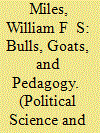

|
|
|
|
|
| Publication |
2009.
|
| Summary/Abstract |
This article illustrates the profound learning that occurs-for students and instructor alike-when a class on third-world development attempts to undertake foreign aid. With undergraduate, graduate, and departmental money, I purchased bulls and carts for farmers, and goats for widows, in two West African villages. Such experiential learning personalized for students the study of micropolitics under conditions of poverty, the development of organizational structure, and north-south dependency.
|
|
|
|
|
|
|
|
|
|
|
|
|
|
|
|
| 6 |
ID:
085555
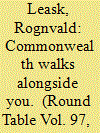

|
|
|
| 7 |
ID:
114609


|
|
|
|
|
| Publication |
2012.
|
| Summary/Abstract |
Since 2001, Afghanistan has received over $50 billion in development aid, yet there is scant evidence to suggest that it has been effective in delivering stabilisation or security objectives, and the perceptions of aid are overwhelmingly negative. The unprecedentedly large influx of development aid is also one of the recognised sources of corruption in Afghanistan which itself undercuts Afghan institutions and has seriously damaged the credibility of the Afghan government with its own people. This paper draws on academic and government literature and asserts that while development aid is contributing positively to stability at the tactical level, the unintended consequences of the large flows of financial aid into Afghanistan are undermining its strategic potential to connect the Afghan people to their government. It concludes that unless the international community works together with the Afghan government to tackle corruption head-on, Afghanistan's future development will be fatally compromised.
|
|
|
|
|
|
|
|
|
|
|
|
|
|
|
|
| 8 |
ID:
127807
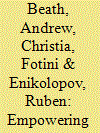

|
|
|
|
|
| Publication |
2013.
|
| Summary/Abstract |
In societies with widespread gender discrimination, development programs with gender quotas are considered a way to improve women's economic, political, and social status. Using a randomized field experiment across 500 Afghan villages, we examine the effects of a development program that mandates female participation. We find that even in a highly conservative context like Afghanistan, such initiatives improve outcomes specific to female participation in some economic, social, and political activities, including increased mobility and income generation. They, however, produce no change in more entrenched female roles linked to family decision-making or in attitudes toward the general role of women in society.
|
|
|
|
|
|
|
|
|
|
|
|
|
|
|
|
| 9 |
ID:
121780
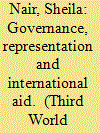

|
|
|
|
|
| Publication |
2013.
|
| Summary/Abstract |
The growth of the postwar 20th century international aid architecture has generated much debate over the successes and failures of aid, its changing forms and its challenges. This article uses this aid landscape to explore the representational or discursive power and authority of the aid donor over the aid recipient. It suggests that representations about what aid does, its modalities and dispensations reproduce a hegemonic discourse and that representational authority in diagnosing aid's problems and prescribing solutions resides generally on one side of the aid binary. It thus focuses on the hierarchical or asymmetric relations of power implied by such a binary, on the way development aid in particular has come to shape self-understandings of donors in relation to recipients, and on the discursive labour that enables such a construction. It also explores how the post-Washington consensus on poverty eradication has embedded neoliberal solutions to development. The reproduction of the hegemonic aid discourse is examined in reference to NGOs involved in the dispensing of aid in Southeast Asia by drawing on scholarly literature and field research in Southeast Asia and Washington DC.
|
|
|
|
|
|
|
|
|
|
|
|
|
|
|
|
| 10 |
ID:
154073
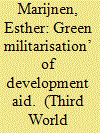

|
|
|
|
|
| Summary/Abstract |
To ‘save’ the Virunga National Park, located in the east of the Democratic Republic of the Congo, the European Commission (EC) allocates development aid to the paramilitary training of the park guards, their salaries, and mixed patrols of the guards together with the Congolese army. Moreover, the ‘development’ projects the EC supports around the park have militarising effects as they are based on a soft counter-insurgency approach to conservation and to address dynamics of violent conflict. This amounts to the ‘green militarisation’ of development aid. This article describes how a personalised network of policymakers within the EC renders militarised conservation-related violence and controversy around the Virunga park invisible, by framing contestations and violence in and around the park as solely caused by economic factors and motivations. Moreover, by ‘hiding’ the fact that the EC aid is used to fund armed conservation practices, policymakers circumvent political debate about the use of development funds for (para)military expenditures. While the existing literature focuses on the importance of securitised discourses to explain the militarisation of conservation, this article indicates that in addition, it is important to focus on these more mundane practices of securitisation within international organisations that ultimately fund the militarisation of conservation.
|
|
|
|
|
|
|
|
|
|
|
|
|
|
|
|
| 11 |
ID:
171845
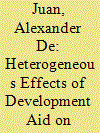

|
|
|
|
|
| Summary/Abstract |
Many countries experience massive aid surges when civil wars end. However, operational contexts tend to remain particularly sensitive due to a combination of persisting local-level cleavages and low-quality state institutions. Consequently, aid provision risks inciting distributional conflicts and violent unrest—most notably when resources are injected into areas of high social heterogeneity or particularly weak state administration. I investigate this argument in the case of postwar Nepal. I combine geo-coded aid data with village-level information on various forms of violent unrest, as well as on social demographics and institutional quality. The panel analyses indicate positive short-term effects of aid on social unrest. More fine-grained estimations reveal that this effect is driven by a short-term escalation of violence against nonstate actors—in particular in ethnically fractionalized villages under the administration of weakly performing local-level state institutions. Descriptive cross-country analyses indicate that aid may have similar violence-inducing effects in other postwar contexts.
|
|
|
|
|
|
|
|
|
|
|
|
|
|
|
|
| 12 |
ID:
099814


|
|
|
|
|
| Publication |
2010.
|
| Summary/Abstract |
This article presents a new analytical approach to the study of aid negotiations. Building on existing approaches but trying to overcome their limitations, it argues that factors outside of individual negotiations (or the `game' in game-theoretic approaches) significantly affect the preferences of actors, the negotiating strategies they fashion, and the success of those strategies. This approach was employed to examine and compare the experiences of eight countries: Botswana, Ethiopia, Ghana, Mali, Mozambique, Rwanda, Tanzania and Zambia. The article presents findings from these country studies which investigated the strategies these states have adopted in talks with aid donors, the sources of leverage they have been able to bring to bear in negotiations, and the differing degrees of control that they have been able to exercise over the policies agreed in negotiations and those implemented after agreements have been signed. It argues that Botswana, Ethiopia and Rwanda have been more successful than the other five cases in levering negotiating capital from the economic, political, ideological and institutional conditions under which negotiations occur.
|
|
|
|
|
|
|
|
|
|
|
|
|
|
|
|
| 13 |
ID:
152082


|
|
|
|
|
| Summary/Abstract |
Since 2009 the USA and the Bolivian government have been trying to fix their broken diplomatic relations. These negotiations culminated in 2011 in the signing of a bilateral agreement but, ultimately, failed to establish a basis for mutually acceptable development aid relations. This article analyses these negotiations and suggests a partial explanation that accounts for their dynamics and results. Specifically it shows how the negotiations have pitted Bolivian demands for state sovereignty and mutual respect, based on an egalitarian understanding of inter-state relations, against the US emphasis on common obligations and universal rights, informed by a non-egalitarian notion of liberal hegemony.
|
|
|
|
|
|
|
|
|
|
|
|
|
|
|
|
| 14 |
ID:
156554


|
|
|
|
|
| Summary/Abstract |
The European Union (EU) is the world’s biggest donor of aid to developing countries. The provision of EU aid is conditional on respect for human rights and democratic principles in the recipient countries. This article questions to what extent norms always yield to interests in decisions over whether to sanction breaches of human rights and democracy. Building on a theory that allows the simultaneous consideration of different norms, the article suggests that rather than interests being the determining factor when the EU takes decisions on implementing sanctions, the weighing of various norms and the choice to follow one of them can explain why sanctions have been avoided in certain cases in Rwanda. The article shows that this weighing of different norms plays an important role in foreign policy decisions and can have concrete consequences with regard to sanctions. In so doing, it advances the literature on the EU’s global role by developing a theoretical account of the evaluation process and the ultimate decision to act in accordance with one norm in particular.
|
|
|
|
|
|
|
|
|
|
|
|
|
|
|
|
| 15 |
ID:
159576
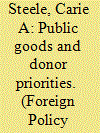

|
|
|
|
|
| Summary/Abstract |
Over the past two decades, development assistance for health (DAH) has reached record levels. Yet, many developing states continue to struggle with diseases easily prevented and treated in industrialized states. Within the aid literature, DAH has historically been viewed as technical rather than political and has been largely disregarded. I argue that, like other forms of foreign aid, DAH may be subject to political influences; and that identifying those interests requires moving beyond dyad-level conceptualizations of political interests. I apply a public goods model to bilateral aid allocations for infectious disease control, using disease characteristics to specify recipients’ need and donors’ interests. I use an original dataset to model disease-specific aid allocations. The results suggest that, within the public goods setting of global disease control, bilateral donors allocate aid to maximize their own payoff. In addition, this analysis provides a theory-driven explanation for poor health outcomes in many developing countries where aid allocations fail to match need.
|
|
|
|
|
|
|
|
|
|
|
|
|
|
|
|
| 16 |
ID:
153620


|
|
|
|
|
| Summary/Abstract |
Contemporary development assistance often takes the form of subcontracted state-building. Foreign donors hire for-profit firms to provide services and to improve or create institutions in developing countries, particularly those experiencing internal conflict. This arrangement creates two counterproductive dynamics: first, it introduces agency problems between donors, recipient states, subcontractors, and citizens; and second, it undermines the long-run development of domestic bureaucratic capacity by creating disincentives for the host government to invest. These dynamics hinder, rather than foster, the legitimacy of state institutions. This paper summarizes trends in external support to state-building since the 1970s and illustrates subcontracted state-building with examples from Colombia.
|
|
|
|
|
|
|
|
|
|
|
|
|
|
|
|
| 17 |
ID:
113785
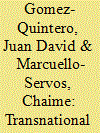

|
|
|
|
|
| Publication |
2012.
|
| Summary/Abstract |
This article analyses a particular case of interactions between "Southern" and "Northern" nongovernmental organizations (NGOs). It considers a sample of Colombian social movements and organizations concerned with victims of Colombian armed conflicts as well as some Spanish NGOs working in Colombia. Specifically, it considers relationships, communication processes, and organizational patterns, and identifies an emergent practice of "transnational political echolocation" understood in terms of mobilizing and grievance strategies within a transnational arena shaped by information and communication technologies.
|
|
|
|
|
|
|
|
|
|
|
|
|
|
|
|
| 18 |
ID:
166696
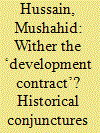

|
|
|
|
|
| Summary/Abstract |
This paper examines methodological avenues for a historical sociology of development through a close reading of Naomi Hossain’s recent book, The Aid Lab: Understanding Bangladesh’s Unexpected Success (2017). Hossain’s conjunctural perspective, the formative moment of Bangladesh in environmental catastrophe, war and famine in the 1970s, establishes a novel account of the country’s development trajectory. Contingencies of the moment and consequent political uncertainties committed an emergent national elite to a largely informal but substantive social compact against future crises of subsistence. The result was a specific, transnational power configuration rendering Bangladesh a test case for developmental interventions and the production of knowledge regarding them. Debates in critical development studies have often posited that such ‘elite commitment’ is a consequence and not so much a precondition for social improvement, brought about through struggles from ‘below.’ How might these positions be reconciled by shifting the temporal frames of reference? By rendering historical processes legible as conflicting and complementary interactions between different social forces and actors? How can such actors be envisaged without presuming their identities and interests as fixed or given, but rather, as shaping and being shaped by such processes? These questions motivate the immanent critique and reappraisal of Hossain’s timely work, highlighting its significance for dynamic analyses of historical capitalism today through the ‘universal particularities’ of the national case.
|
|
|
|
|
|
|
|
|
|
|
|
|
|
|
|
|
|
|
|
|